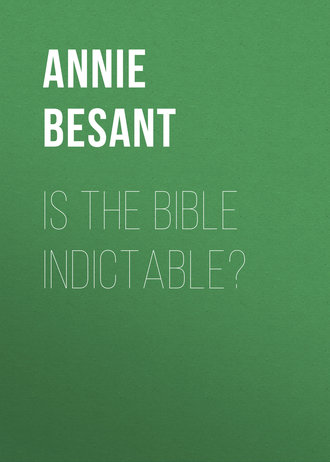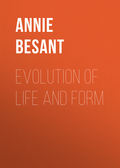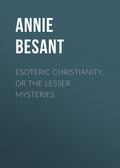
Annie Besant
Is the Bible Indictable?
The Song of Solomon is a marriage-song of the sensual and luxuriant character: put Knowlton side by side with it, and then judge which is most calculated to arouse the passions. It is almost impossible to select, where all is of so extreme a character, but take i. 2, 13; ii. 4–6, 17; iii. 1, 4; iv. 5, 6, 11; v. 2–4, 8, 14–16; vii. 2, 3, 6–10, 12; viii. 1–3, 8–10. Could any language be more alluring, more seductive, more passion-rousing, than the languid, uxorious, “linked sweetness long drawn out” of this Eastern marriage-ode? It is not vulgarly coarse and offensive as is so much of the Bible, but it is, according to the ruling of the Lord Chief Justice, a very obscene poem. One may add that, in addition to the allusions and descriptions that lie on the surface, there is a multitude of suggestions not so apparent, but which are thoroughly open to all who know anything of Eastern imagery.
After the Song of Solomon, it is a shock to come to the prophets; it is like plunging into cold water after being in a hothouse. Unfortunately, with the more bracing atmosphere, we find the old brutality coming again to repel us, and coarse denunciation shocks us, as in Isaiah iii. 17. How would the Lord Chief Justice have dealt with Isaiah if he had lived in his day, and acted as is recorded in Isaiah xx., 2–4? He clearly would have put him in a lunatic asylum (Trial, p. 168). If it were not that there are so many worse passages, one might complain of the taste shown in the comparison of Isaiah xxvi. 17, 18; the same may be said of Isaiah xxxii. 11, 12. In Isaiah xxxvi. 12 we have a repetition of 2 Kings xviii. 27, which we could well have spared. In Isaiah lvii. 8, 9, we meet a favourite simile of the Jewish prophets, wherein God is compared to a husband, and the people to an unfaithful wife, and the relations between them are described with a minuteness which can only be fitly designated by the Solicitor-General's favourite word. Isaiah lxvi. 7–12 would be regarded as somewhat coarse in an ordinary book. The prophets get worse as they go on. Jeremiah i. 5 is the first verse we meet in Jeremiah which the Solicitor-General would take exception to. We next meet the simile of marriage, in Jeremiah ii., 20, iii. 1–3, 6–9, verse 9 being especially offensive. Jer. v. 7, 8, is coarse, as are also Jer. xi. 15 and xiii. 26, 27. Ought the girls' schools to read Jer. xx. 17, 18? But, perhaps, as Ezekiel is coming, it is hypercritical to object to Jeremiah. Lamentations i. 8, 9, is revolting, and verse 17 of the same chapter uses an extremely coarse simile. Ezekiel is the prophet who ate a little book and found it disagree with him: it seems a pity that he did not eat a large part of his own, and so prevent it from poisoning other people. What can be more disgusting than Ez. iv. 12–15? the whole chapter is absurd, but these verses are abominable. The prophet seems, like the drawers of the indictment against us, to take pleasure in piling up uncomfortable terms, as in Ez. vi. 9. We now come to a chapter that is obscene from beginning to end, and may, I think, almost claim the palm of foulness. Let any one read through Ez. xvi., marking especially verses 4–9, 15–17, 25, 26, 33, 34, 37, 39, and then think of the absurdity of prosecuting Knowlton for corrupting the morals of the young, who have this book of Ezekiel put into their hand. After this, Ez. xviii. 6, 11, and 15 seem quite chaste and delicate; and no one could object to Ez. xxii. 9–11. Ez. xxiii. is almost as bad as chapter xvi., especially verses 6–9, 14–21, 29, 41–44. Surely if any book be indictable for obscenity, the Bible should be the first to be prosecuted. I know of no other book in which is to be found such utterly unredeemed coarseness. The rest of Ezekiel is only bloodthirsty and brutal, so may, fortunately, be passed over without further comment. Daniel may be left unnoticed; and we now come to Hosea, a prophet whose morals were, to speak gently, peculiar. The “beginning of the word of the Lord by Hosea,” was the Lord's command as to his marriage, related in Hosea i. 2; we then hear of his children by the said wife in the remainder of the chapter, and in the next chapter we are told, Hosea ii. 2, that the woman is not his wife, and from verse 2–13 we have an extremely indecent speech of Hosea on the misdeeds of the unfortunate creature he married, wherein, verse 4, he complains of the very fact that God commanded in chap. i. 2. Hosea iii. 1–3 relates another indecent proceeding on Hosea's part, and his purchase of another mistress; whether girls' morals are improved by the contemplation of such divine commands, is a question that might fairly be urged on Lord Sandon before he next distributes Bibles to little children of both sexes. The said girls must surely, as they study Hosea iv. 10–18, wonder that God expresses his intention not to punish impurity in verse 14. It is impossible, in reading Hosea, to escape from the prevailing tone of obscenity; chaps. v. 3, 4, 7; vi. 9, 10; vii. 4; viii. 9; ix. 1, 10, 11, 14, 16; xii. 3; xiii. 13, every one of these has a thought in it that all must regard as coarse, and which comes distinctly within the ruling of the Lord Chief Justice as to obscenity; there is scarcely one chapter in Hosea that does not, with offensive reiteration, dwell on the coarsest form of wrongdoing of which women are capable. Joel iii. 3 is objectionable in a comparatively slight degree. Amos, although occasionally coarse, keeps clear of the gross obscenity of Hosea, as do also Obadiah and Jonah. Micah i. 7, 8, 11, would scarcely be passed by Sir Hardinge Giffard, nor would he approve Micah iv. 9, 10. Nahum iii. 4–6 is almost Hoseatic, and Habakkuk ii. 5, 16 runs it close. The remaining four prophets are sometimes coarse, but have nothing in them approaching the abominations of the others, and we close the Old Testament with a sigh of relief.




